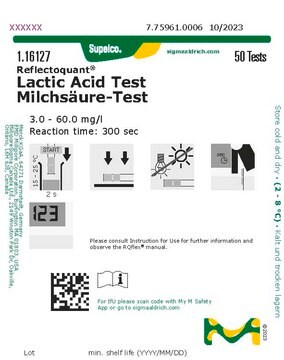MAK058
D-Lactate Colorimetric Assay
sufficient for 100 colorimetric tests
Sinônimo(s):
D-Lactate Test Kit
Faça loginpara ver os preços organizacionais e de contrato
About This Item
Código UNSPSC:
12161503
NACRES:
NA.84
Produtos recomendados
uso
sufficient for 100 colorimetric tests
aplicação(ões)
cosmetics
food and beverages
método de detecção
colorimetric
doença(s) relevante(s)
neurological disorders; gastrointestinal diseases
temperatura de armazenamento
−20°C
Descrição geral
D-Lactate, typically present in the bloodstream at nanomolar concentrations, is produced by an intestinal source or via the methylglyoxal pathway. In mammals, D-Lactate metabolism requires D-Lactate hydrogenase and is metabolized slowly, thus an increase in blood concentration levels can lead to acidemia and acidosis. The severity of this D-lactic acidosis can be associated with neurotoxic symptoms. Significant D-Lactate accumulations in the body can also be related to impaired metabolism and excretion.
Aplicação
D-Lactate Colorimetric Assay kit has been used to determine the stereospecificity of lactate produced.
Adequação
Suitable for use with samples of serum, plasma, cells, culture and fermentation media.
Princípio
In this assay, D-Lactate is specifically oxidized by D-Lactate hydrogenase and generates a proportional colorimetric product measured at 450 nm. The useful concentration range in samples is 0.1-10 mM D-Lactate.
Palavra indicadora
Danger
Frases de perigo
Declarações de precaução
Classificações de perigo
Eye Dam. 1 - Skin Corr. 1B
Código de classe de armazenamento
8A - Combustible corrosive hazardous materials
Certificados de análise (COA)
Busque Certificados de análise (COA) digitando o Número do Lote do produto. Os números de lote e remessa podem ser encontrados no rótulo de um produto após a palavra “Lot” ou “Batch”.
Já possui este produto?
Encontre a documentação dos produtos que você adquiriu recentemente na biblioteca de documentos.
Os clientes também visualizaram
Lucas P Castro et al.
Journal of dairy science, 102(11), 9857-9869 (2019-09-16)
Rehydrated and ensiled mature ground corn has high ruminal starch digestibility, but particle size (PS) and dietary starch proportion (ST) can affect starch digestion and lactating cow performance. We evaluated the effect of rehydrated and ensiled corn (REC), PS, and
Poonam Naik et al.
Current eye research, 45(2), 184-189 (2019-08-31)
Purpose: Microbiological investigations of vitreous fluid have often failed to detect the causative agent in infectious endophthalmitis resulting in a clinical dilemma. D-Lactate is a byproduct of bacterial metabolism, and its accumulation in sterile body fluids indicates bacterial infection. The
Ottavia Benedicenti et al.
Journal of fish diseases, 42(9), 1241-1258 (2019-06-18)
A relationship between increasing water temperature and amoebic gill disease (AGD) prevalence in Atlantic salmon (Salmo salar) has been noted at fish farms in numerous countries. In Scotland (UK), temperatures above 12°C are considered to be an important risk factor
Ayca Erkin-Cakmak et al.
The Journal of clinical endocrinology and metabolism, 104(7), 3003-3011 (2019-03-15)
To investigate the link between dietary sugar consumption and two separate pathogenetic mechanisms associated with metabolic syndrome: de novo lipogenesis (DNL) and nonenzymatic glycation. We assessed changes in serum d-lactate (the detoxification end-product of methylglyoxal) concentration in response to 9
William H. Hoffman et al.
Journal of clinical research in pediatric endocrinology, 12(2), 160-167 (2019-09-14)
To determine the time relationships of soluble receptor for glycation end-products (sRAGE), [a decoy of the advanced glycation end-products (AGE)-RAGE axis] and D-lactate, (a metabolite of methylglyoxal) in the inflammatory response to diabetic ketoacidosis (DKA). Sixteen children and adolescents with
Nossa equipe de cientistas tem experiência em todas as áreas de pesquisa, incluindo Life Sciences, ciência de materiais, síntese química, cromatografia, química analítica e muitas outras.
Entre em contato com a assistência técnica

